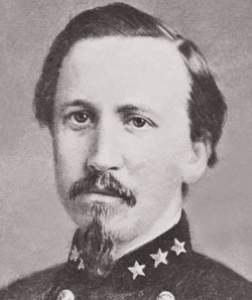Bradley Tyler Johnson (Notable Americans)
Reference
JOHNSON, Bradley Tyler, soldier, was born in Frederick, Md., Sept. 29, 1829; son of Charles Worthington and Eleanor Murdock (Tyler) Johnson; grandson of Col. Baker and Catharine (Worthington) Johnson and of William Bradley and Harriet (Murdock) Tyler; great-grandson of Col. Nicholas Worthington of Belvoir, and a descendant of Capt. Thomas Johnson, who was born in Yarmouth, Norfolk county, England, in 1644, and settled in Calvert county, Md., in 1690; and of Robert Tyler, who immigrated to Prince George county, Md., 1660. Col. Baker Johnson was a Revolutionary soldier and fought at Brandywine and Germantown. Bradley Tyler Johnson was graduated at the College of New Jersey, A.B., 1849, A.M., 1851; studied law at Harvard, 1850-51, was admitted to the bar, and [practiced] in Frederick, Md., 1851-61. He was elected state's attorney of Frederick county, November, 1851; chairman of the Democratic state committee, 1859, and delegate to the Democratic national convention in 1860, and supported the southern wing of the party. When the civil war broke out he organized a company at his own expense and served in the 1st Maryland (Confederate) regiment as its captain. He was promoted major, June 16, 1861; lieutenant-colonel, July 21, 18- 61, and colonel, March 18, 1862. He was commissioned brigadier-general of cavalry, June 28, 1864, and commanded his regiment in all the battles of the Shenandoah valley and in the seven days' battles around Richmond, Va. At Harrisburg, June 6, 1862, Colonel Johnson had his horse shot under him, and on the death of Gen. Turner Ashby, Johnson with his regiment "drove the enemy off with heavy loss," capturing Lieut.-Col. Thomas C. Kane of the Pennsylvania "Bucktails"; and in the battle of Cross Keys, June 8, 1862, by direction of General Ewell, he carried one of the captured bucktails, the insignia of their beaten foe, affixed to his colors as a trophy. On Aug. 28, 1862, he commanded the 2d brigade of Jackson's division and in the raid around Pope's army captured a messenger with important dispatches, that disclosed to Jackson the tactics of the Federal commanders. The remnant of his regiment, decimated by loss, was mustered out and he was assigned to Gen. T. J. Jackson's division. He commanded a brigade under Early in 1864, and took part in the attack on Washington. On July 3, 1864, at Leetown, he drove Mulligan across the railroad, and was in turn driven back by Siegel, who reinforced Mulligan, and on June 11 he warned Early of the reinforcement of Washington by two corps from General Grant's army, and Early withdrew from before the city. As an acknowledgment of his services in defeating the purposes of Kilpatrick's and Dahlgren's raids around Richmond, Feb. 28, 1864, Colonel Johnson's services were recognized in general orders, and he was presented with a sabre of Gen. Wade Hampton. He took heroic measures to feed the Federal prisoners in North Carolina while in command of the post at Salisbury, N.C., 1864-65. After the war he settled in Richmond, Va., and [practiced] law, 1865-79. He removed to Baltimore and continued his practice there, 1879-90. He was a member of the Democratic national convention, 1872; a member of the Virginia state senate, 1875-79, and president of the electoral college of Maryland in 1884. He is the author of: Chase's Decisions (1876); The Foundation of Maryland (1883); Memoirs of Gen. Joseph E. Johnston (1891); General Washington in the "Great Commanders" series (1894); The Confederate History of Maryland (1899); and the article: "Stonewall Jackson's Intentions at Harper's Ferry" in Battles and Leaders of the Civil War.
Rossiter Johnson, ed., “Johnson, Bradley Tyler," The Twentieth Century Biographical Dictionary of Notable Americans, vol. 6 (Boston: The Biographical Society, 1904).



